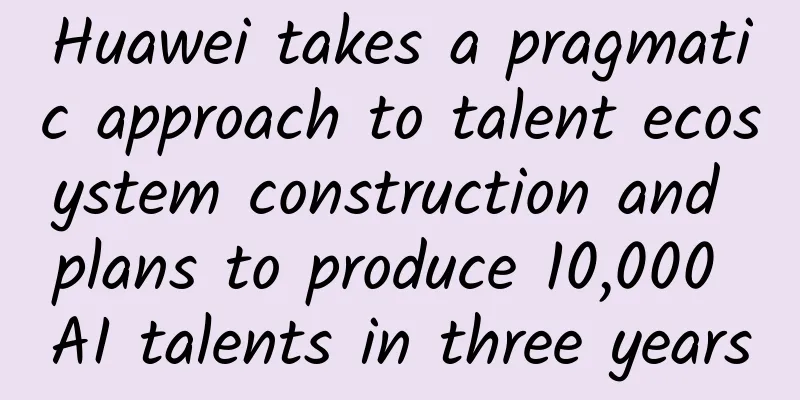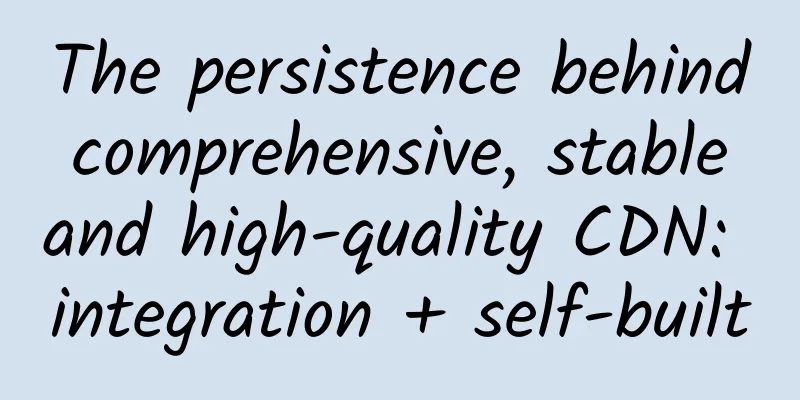Huawei takes a pragmatic approach to talent ecosystem construction and plans to produce 10,000 AI talents in three years

|
[51CTO.com original article] On the second day of Huawei China Ecosystem Partner Conference 2019, Yang Wenchi, Vice President of Huawei Enterprise China and President of Huawei Ecosystem University, delivered a heavyweight keynote speech entitled "Integrating Resources to Operate Ecosystem and Win-Win in the Intelligent Era". In his speech, Yang Wenchi pointed out that Huawei believes that platform + AI + ecology is an important innovation strategy to cope with future digital transformation, and the construction of talent ecology will be a very important part of it.
Huawei is praised for its talent training and hopes to export 10,000 AI talents in three years Yang Wenchi analyzed that from the perspective of partners, sales partners lack application-oriented talents. For this reason, Huawei has jointly set up and implanted some courses with some colleges and universities to let students learn about Huawei and the ICT industry in advance. Many students have obtained Huawei's HCIA, HCIP and even HCIE certifications while in school, so they can quickly get started when they enter the workplace. What solution partners lack is innovative talents who master cutting-edge technologies. Huawei focuses on cultivating such talents, especially AI talents, in the future, and jointly develops courses with colleges and universities to integrate Huawei's new technology application experience into the course content of colleges and universities. "On the one hand, we launched the HCIA-AI certification, hoping that students can complete the relevant knowledge on campus when they pass the certification. On the other hand, we support colleges and universities to open AI majors to attract talents, and also train professional lecturers and teachers through social training institutions, so that they can train more students and enrich the talent team." Yang Wenchi revealed that Huawei hopes to export 10,000 talents in AI-related majors in the next three years. Chen Baoguo, executive vice secretary-general of the China Software Industry Association and vice secretary-general of the Information Technology New Engineering Industry-University-Research Alliance, is very grateful for Huawei's contribution to domestic talent training. He admitted that the lack of talent, cases and technology are the main problems facing new engineering, but the national government and the Ministry of Education attach great importance to these issues. On the one hand, various policies have been introduced to accelerate the training of teachers, and on the other hand, the traditional teaching model has been reformed to allow students to truly face the front-line practice and project teaching, so that students can more quickly understand the latest market and product trends in the practical field. "We are very grateful to Huawei. Their dedication to new engineering is also a reflection of Huawei's social responsibility as a whole. They have also made great contributions to China's ICT sector, as well as to China's education ecosystem, industrial ecosystem, and talent ecosystem. In addition, many software companies are Huawei's ecological partners, so many new information technologies are also involved in the construction of the new engineering system." Chen Baoguo emphasized. Wu Fei, director of the Institute of Artificial Intelligence at Zhejiang University and leader of the working group of the Ministry of Education's Artificial Intelligence Science and Technology Innovation Expert Group, also shared his views on the construction of a talent ecosystem from the perspective of an education practitioner. He believes that when smart education begins to penetrate campuses, people will have to think about how to use technical means, better theoretical methods, and better teaching platforms to support the changes of the times. Huawei previously gave a batch of chips to Zhejiang University and Shanghai Jiaotong University for free to help students understand cloud computing training models and terminal AI reasoning models through actual combat. "Engineering colleges are very fond of hands-on practice. Huawei provides such a channel for students to be able to combine the most cutting-edge ecological system of artificial intelligence in the classroom with cloud, network and terminal. This is a very good example." The three parties each contribute their best to collaborative innovation So how can manufacturers, schools, and educational organizations each perform their respective duties and do their best while at the same time achieving collaborative innovation? Yang Wenchi, Chen Baoguo, and Wu Fei also answered this question from their own perspectives. Yang Wenchi believes that from the manufacturer's perspective, Huawei has four advantages. First, it understands the real demand for talent better and is very clear about what types of talent the ICT industry needs. Second, Huawei has deep industry experience and is more experienced in how to transform research results into products for commercial sales and build industry competitiveness after industry-university-research cooperation. Third, Huawei has a strong sense of social responsibility and often makes large investments without a business model. Fourth, Huawei's products have a very high global market share, which means that Huawei is very familiar with the needs of end customers. Therefore, when setting up school courses, the output teaching materials will be more targeted and pragmatic. Wu Fei pointed out that more than 8 million students enter colleges and universities every year. As the division of labor in society becomes more and more detailed, colleges and universities have different colleges and different majors. Talent cultivation based on subject attributes is its characteristic and advantage. For artificial intelligence majors, there are many disciplines in universities to support them. When cultivating professional talents, general education and cross-disciplinary education must be carried out so that students can learn general knowledge courses and cross-disciplinary professional courses. This is the advantage of colleges and universities. "Now many universities have increased the content of practical training. Some teachers go to enterprises to learn, some universities introduce corporate mentors, or cooperate with enterprises to enter universities to cultivate specialized talents. This is a major feature of the new era of intelligent education." Chen Baoguo believes that the New Engineering Alliance has four main roles in information technology: first, to build a platform. The alliance has built many industry-university-research cooperation platforms; second, to pool resources. New engineering brings together the resources of new industry-university-research in the field of information technology; third, to focus on innovation. The New Engineering Alliance has brought together a large number of outstanding industry leaders and industry-leading companies. Fourth, it pays more attention to the construction of professional fields. The New Engineering Alliance now has 37 special committees, and he hopes that Huawei will play a more important role in more special committees. "Through Huawei, whether it is technology or innovation, the new engineering has been improved in the entire industry chain system, and the alliance will also pay more attention to providing a platform for the entire new engineering system." He concluded. The reporter learned that in 2019, Huawei officially listed the talent ecosystem as one of the five major types of partners, raising the importance of talent training to a new level. This plays a very important role in the training and accumulation of talents, not only inheriting professional skills but also close to actual combat exercises. In this way, Huawei's talent ecosystem has both the output foundation of universities and the full support of partners, and the future of ICT "prosperity" is just around the corner. [51CTO original article, please indicate the original author and source as 51CTO.com when reprinting on partner sites] |
<<: Apple, Qualcomm, and Intel: 5G
Recommend
Among China Mobile, China Unicom and China Telecom, which 100M broadband is more reliable and cost-effective?
Currently, 100M fiber-optic access to homes has b...
The role of 5G in shaping the future of smart cities
The advent of 5G technology will revolutionize th...
AlexHost: Moldova unlimited VPS from 11.88 EUR/year
I received a message from AlexHost, a foreign hos...
Facing these possible accidents, is your operation and maintenance team ready?
With a loud bang, the data center collapsed The d...
HUAWEI CONNECT 2017 is coming, and the digital transformation of the industry will open up new growth space
At the 2017 Huawei Analyst Conference in April 20...
HostDare adds NVMe disk CN2 GIA line VPS, 15% discount starting from $30/year
After HostDare launched the Los Angeles NVMe SSD ...
It’s 2021, and you’re still confused about the `IEnumerator` and `IEnumerable` interfaces?
[[375509]] This article is reprinted from the WeC...
RepriseHosting: Seattle servers from $27.97/month - L5640/16G memory/1TB or 240G SSD/1Gbps bandwidth
RepriseHosting is a foreign hosting company found...
How to improve WiFi quality without increasing budget? 6 tips to improve enterprise LAN WiFi performance
Assuming your company has no funds for upgrading ...
Aruba: Modernizing the network to enable ubiquitous connectivity
Network edge is an inevitable trend, and user nee...
GSMA: Global 5G connections will reach 1.8 billion by 2025
According to a new study from GSMA, global 5G con...
External tools connect to SaaS mode cloud data warehouse MaxCompute practice
This sharing will be explained from four aspects....
What is edge computing? Why is it called the gas station in the era of smart IoT?
With the rapid development of the Internet of Thi...
Ruishu Information: Beware of misappropriation of payment interfaces, API security protection is imperative
Recently, the security operation and maintenance ...
Shen Bin from CAICT: 5G factories promote high-quality development of "5G+Industrial Internet"
In August 2022, the Ministry of Industry and Info...









